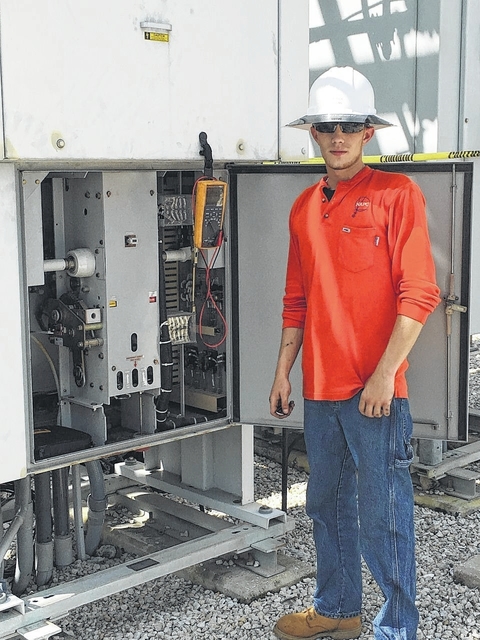HAMLET — Twenty-two-year-old Ryan Collins is seven months into a lifelong career in the utility industry that he is absolutely loving. A 2016 graduate of the Electric Utility Substation and Relay Technology program at Richmond Community College, Collins is living in central Florida and recently returned from a contract job in Iowa.
“Florida is like NASCAR. Everything is really fast pace. I enjoyed Iowa because it reminded me of home,” said Collins, who is used to the small town life of Hamlet. “I never expected to go this far away from Richmond County, but I love Florida. It’s a beautiful place.”
Collins is an associate field technician for North American Protection and Control, an independent provider of protection and control services to the electric utility industry throughout the United States. He was sent to Iowa to do contract work at a wind farm where power is generated by large wind turbines. Walking into the control room of this utility company, Collins said he was very familiar with the Doble Engineering equipment because it was the same equipment he used while in the classroom at RichmondCC.
Doble Engineering Company has been a key partner for the RichmondCC’s EUSRT program through annual donations of test equipment and software. Duke Energy has also been instrumental in the development of the EUSRT program, providing over a million dollars in funding and equipment since the program’s inception in 2011.
The EUSRT program prepares students for careers in the electric utility industry and other industries that rely on complex control systems.
“It’s hard to believe what all I learned in two years in the EUSRT program,” Collins said. “I had no clue what I was getting into when I started the program. And it’s still hard to believe the opportunities that I now have after just two years of college.”
In the utility industry, entry level technicians with two- or four-year degrees in electronics engineering require five years of training to be capable of maintaining and supporting substations and the relay equipment associated with them. The EUSRT program, however, was crafted specifically to develop technicians with the training and skills to begin work immediately in the
utility industry and cut the normal training time in half. Salaries for this two-year degree typically start around $60,000 a year.
Collins received a sign-on bonus when he accepted the job with the Florida company, which helped him pay for his relocation from Hamlet to the Orlando area.
Collins went to the University of North Carolina-Pembroke after graduating Richmond Senior High School in 2012. He did well his first year in college and made the Chancellor’s List, but he was unsure of his career plan with a four-year degree. That’s when he heard about the EUSRT program and decided to enroll at RichmondCC.
“EUSRT program is a great option for people who want to have a guaranteed career after two years of education with very little student debt,” Collins said.
Every student in the EUSRT program who graduated in May now has a job in the utility industry. In fact, one of those graduates, David Hardesty, is also working for the same company as Collins in Florida, and they’re sharing an apartment.
“When I go to work, there’s always a new task or a new problem that has to be solved. I’m not doing the same thing day in and day out and getting burned out,” Collins said. “This job keeps me on my toes and I thrive on the challenges in this field of work.”
Collins is the son of Shirley Collins and Ronald Collins and the grandson of Bert and Barbara Unger of Hamlet.
Wylie Bell is director of marketing and communications for Richmond Community College.

